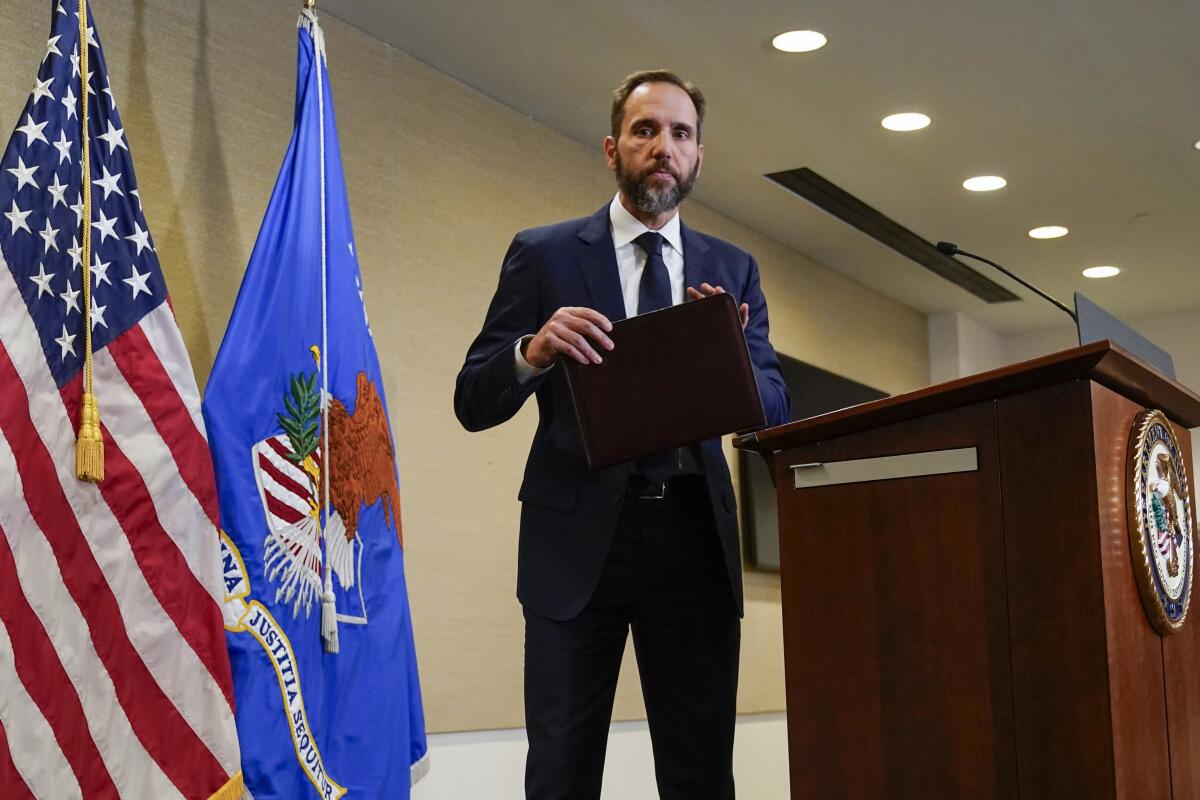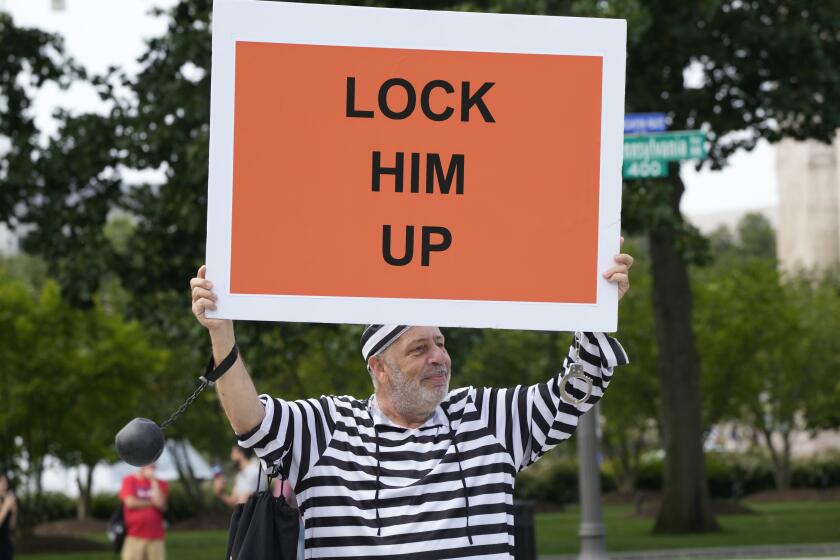Editorial: It’s not election interference to hold a former president accountable for election interference

- Share via
This week special counsel Jack Smith took new steps in the two federal criminal cases in which Donald Trump is the defendant. Contrary to Trump’s claim that Smith is “deranged” and trying to interfere in the election, the special counsel is acting responsibly in trying to ensure that, like any other criminal defendant, Trump will face a jury for alleged crimes.
On Monday Smith filed an appeal with the U.S. 11th Circuit Court of Appeals of a wrongheaded decision by U.S. District Judge Aileen Cannon. She dismissed charges connected with Trump’s alleged unlawful retention of sensitive national defense documents after he left office, on the specious grounds that Congress hadn’t authorized Smith’s appointment.
On Tuesday Smith’s office revealed that a grand jury had approved a superseding indictment related to Trump’s attempt to overturn an election he lost. The new indictment omits references to actions that the Supreme Court has said constitute “official acts” for which Trump enjoys immunity.
The Supreme Court’s decision, along partisan lines, does away with the principle that no one is above the law.
The former president remains charged with the same four offenses described in the original indictment: conspiracy to defraud the United States; conspiracy to obstruct an official proceeding; obstruction of and attempt to obstruct an official proceeding; and conspiracy against rights.
Unless one believes that running for president confers immunity from prosecution — an absurd idea that would turn every declaration of presidential candidacy into a “Get Out of Jail Free” card — Smith is right to persevere in his prosecutions despite the timing. It is not the special counsel’s fault that this comes so close to the presidential election. Trump lawyers have prolonged the process with their legal objections.
The vice president and longtime California prosecutor had a carefully institutionalist answer to Democrats chanting for her opponent’s incarceration.
The Supreme Court is also complicit in the delay, having slow-walked the immunity case before issuing a convoluted and unconvincing ruling in July that said former presidents are entitled to either absolute or presumptive immunity for “official acts.”
It generally left to a lower court the determination of which acts fall into the “official” category. But Chief Justice John G. Roberts Jr. wrote that Trump was absolutely immune from prosecution for alleged conduct involving his discussions with Justice Department officials.
The new indictment accordingly strips out allegations related to Trump’s interactions with Justice Department officials. But it retains references to other actions by Trump, including a conversation with Georgia ‘s secretary of state when he said, “I just want to find 11,780 votes” to overturn Joe Biden’s victory in that state and conversations in which he pressured Vice President Mike Pence to reject lawfully cast electoral votes for Biden.
It shouldn’t take a criminal conviction to convince conscientious voters of Trump’s epic unfitness. But those who support him must now reckon with the fact that their candidate is a convicted felon.
The revised indictment also retains an allegation that Trump violated a law against “obstructing an official proceeding,” despite a Supreme Court ruling in June narrowing that offense to situations that involve tampering with or destroying documents. The indictment suggests that Trump can’t benefit from that decision because of his alleged link to the creation of fraudulent elector certificates.
The superseding indictment presents a robust, detailed and shocking case against Trump. It deserves to be considered by a jury. Unfortunately, it is almost certain that the Nov. 5 election will take place before Trump is acquitted or convicted of either the election-related charges or (if they are revived by an appeals court) the charges connected to the retention of documents.
That wouldn’t change the fact that he was unfit for office before Smith’s recent actions, and before a jury convicted him of falsifying business records in May. Whether or not he is found criminally responsible, Trump’s undeniable attempts to overturn the 2020 election and cling to power disqualified him for another term as president.
But the delay in these cases is related to the election in one way: If Trump wins, he might shut down the prosecutions or perhaps even attempt to pardon himself (something Trump has said is “very unlikely”). That’s another reason among so many others for voters to reject him.
More to Read
A cure for the common opinion
Get thought-provoking perspectives with our weekly newsletter.
You may occasionally receive promotional content from the Los Angeles Times.













